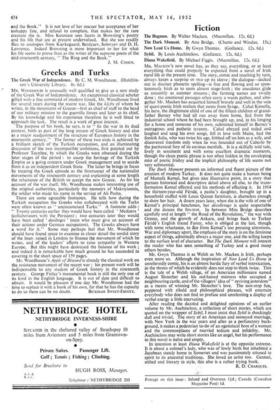Greeks and Turks
MR. WOODHOUSE is unusually well qualified to give us a new study of the Greek War of Independence. An exceptional classical scholar gifted with a fine command of modern Greek, Mr. Woodhouse lived for several years during the recent war, like the klefts of whom he writes, in the mountains of Greece—first as chief of staff to the head of our military mission to the guerrilla forces and later as its chief. By his knowledge and his experience therefore he is well fitted to approach the task. The result is a work of great interest.
The purpose of his book, he says, is to "fix the war in its dual context, both as part of the long stream of Greek history and also as a major readjustment of the structure of European history in the nineteenth century." The former of these two ends is achieved by a brilliant sketch of the Turkish occupation, and an illuminating discussion of the two incompatible 'ambitions, first pointed out by Professor Toynbee, by which the Greeks were obsessed during the later stages of the period : to usurp the heritage of the Turkish Empire as a going concern under Greek management and to secede from it as an independent Greek State. The latter he brings in focus by treating the Greek episode as the forerunner of the nationalist movements of the nineteenth century and explaining at some length the reluctance of the British to accept the new Greece. As for his account of the war itself, Mr. Woodhouse makes interesting use of the original authorities, particularly the memoirs of Makriyiannis, the soldier who made his name in the service of Ali Pasha.
There are some agreeable footnotes. He tells how during the Turkish occupation the Greeks who collaborated with the Turks were often known as " uncircumcised Turks." A footnote adds : " Twenty centuries earlier they would have been called Medizers ' (collaborators with the Persians) ; two centuries later they would have been called dosilogoi ' (men who must give an account of their actions under German occupation). The Greeks always have a word for it." Some may perhaps feel that Mr. Woodhouse should have found space to examine in closer detail the sordid story of the loam raised in London to finance the movement of which he writes, and of the leaders' efforts to raise sympathy in Western Europe. But this might have destroyed the balance of his work ; and indeed it is remarkable how much ground he has succeeded in covering in the short space of 159 pages.
Mr. Woodhouse's Apple of Discord is already the classical work on the resistance movement of the recent war ; his present work will be indispensable to any student of Greek history in the nineteenth century. George Finlay 's monumental book is still the only one of its kind in the English language. It is out of date and difficult to obtain. It would be pleasant if one day Mr. Woodhouse had the time to replace it with a book of his own, for that he has the capacity


































 Previous page
Previous page